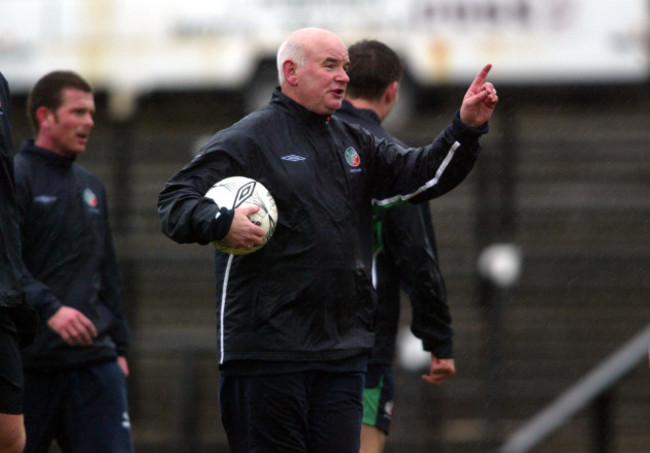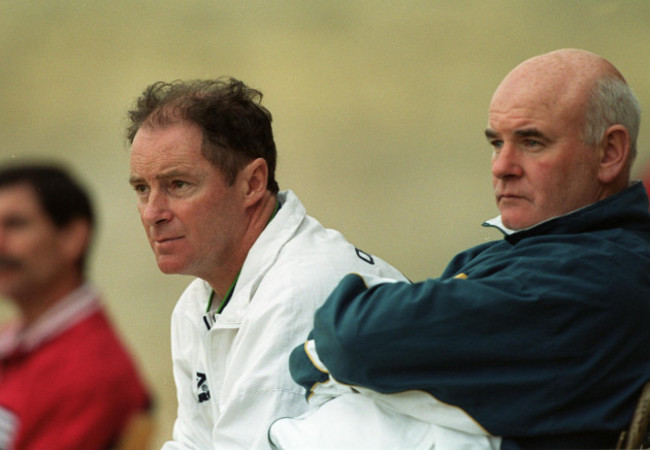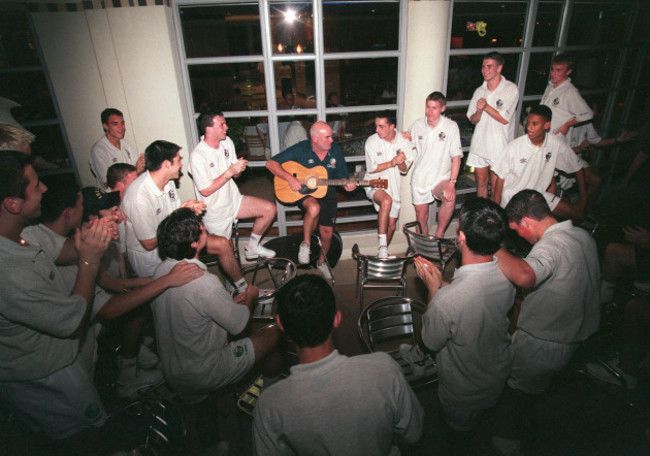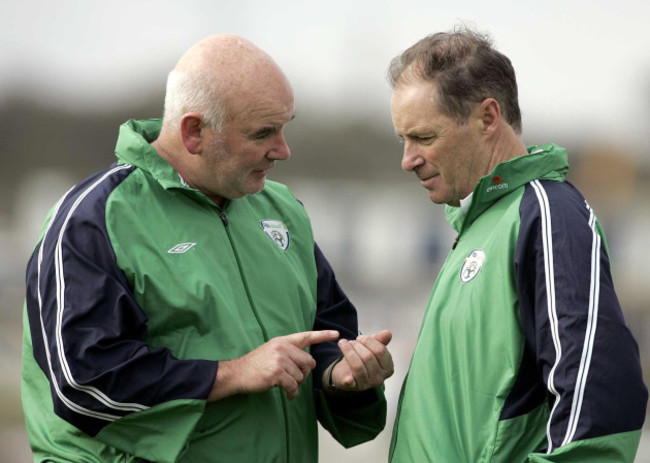WATCHING OLD VIDEOS of the Republic of Ireland’s remarkable achievement at the U-20 World Cup twenty years ago, certain little things catch your eye.
Like, after Damien Duff scores his wonder-goal against Morocco in the Round of 16 clash and is instantly buried under a mound of green jerseys, the camera pans to the right and there’s Noel O’Reilly, with both hands in the air, not attracted to the pile-on but focused instead on racing across the pitch to embrace and celebrate with the energy-sapped, sweat-soaked players collapsed on the ground.
And then there’s the moment when the full-time whistle goes in the quarter-final with Spain and Brian Kerr’s initial instinct is to jump into the arms of his assistant.
Or, 1-0 down in the semi-final to Argentina, Noel is crouched over on the sideline – motivating his players with a very simple but effective phrase: ‘We can do it’.
It must be a lovely legacy to have when a handful of clips can still reflect someone’s life and personality so much. But Noel O’Reilly was always consistent and reliable.
Best-known as Kerr’s right-hand man, he was also his own man.
He started off as a printer but was a born educator and his two loves – teaching and football – intertwined perfectly when he began working as a Recreation Officer with St Joseph’s School for the Blind in his local community of Dublin’s northside.
In 2008, his long-time friend, Vincent Butler, wrote beautifully of Noel’s time there
Noel got the position and revolutionised it, turning it from the staid, traditional, disciplined regime he inherited into a fun-filled, inventive and exhilarating situation.Whenever there was a mid-week game at Tolka Park, you would see a chain of visually impaired kids, led by Noel, winding their way down Grace Park Road to the ground.”
Beginning his formal coaching career with Belvedere’s underage teams, Noel quickly made a name for himself, racking up as many qualifications as possible. And it was during the early 1980s, when he first met Kerr. Soon, they were both involved as assistants to Liam Tuohy, who was in charge of the Irish youth setup at the time.
“It was Tuohy who brought us together,” he says.
“Noel had been working with the Shamrock Rovers youth side, alongside Ray Treacy and Eamon Dunphy, when John Giles was senior manager. I remember when Tuohy rang me about getting involved and he said, ‘We’ll work together – you, me and Noel – how are you with that?’ And I’d had a flavour of Noel’s personality on the coaching courses even though I didn’t know him well. And when we got together…”
As good as the mid-90s were for Irish underage football, the early-80s weren’t bad either. In five years, teams reached three European Championships and one World Cup. In 1984, an excellent U-18 group got to the semi-finals of the Euros in the Soviet Union, losing to the host nation after an unbeaten run through the group stage.
When Jack Charlton arrived in 1986, Tuohy was ousted, his position largely untenable. The story goes that Charlton commandeered a half-time team talk during a game against England, undermining Tuohy’s management. Later, speaking to Paul Rowan, Charlton went in two-footed.
“Liam (Tuohy) made a bloody big mistake. He could have been on the inside. Now he’s on the outside. With everything that I’ve achieved the one thing that gives me pleasure is that I stuffed it up his arse.”
Kerr took up a job as manager of St. Patrick’s Athletic while Noel returned to his day job in Drumcondra. But, within a few years, they were reunited at Inchicore.
“There was a magic about Noel – everyone got a special vibe from him,” Kerr says.
He had an aura of humility and brilliance about him that anyone who did a coaching course with him, or helped out coaching with him or anyone he had a quiet chat with over the years or the players who trained with him – they’d all speak of him in the most lovely of terms.
I eventually got him into Pat’s – that took a few years to sort out because of his own work situation in the School for the Blind. When I got the youths job, I was able to bring him in again. From the off, we clicked. Initially, he was still trying to keep his day job with Pat’s and helping me out on a game-to-game basis. Until eventually, the FAI offered me the Technical Director’s job on top of the youths job. I said I’d do it provided Noel was brought in on a full-time basis as Development Officer.”
In many ways, Malaysia was an extension of the work the pair had done when first partnered up by Tuohy sixteen years earlier. This time, they had more experience, more awareness and a more fine-tuned approach. The relationship, the friendship was also a lot stronger and deeper, right down to pet names for each other.
“He used to call me ‘Murphy’,” Kerr says.
“But then Tuohy used to call me ‘Rasher’. I thought it was really complimentary that Liam Tuohy – the original ‘Rasher’ – was calling me ‘Rasher’. Then I discovered that in his life there were about a thousand ‘Rashers’ so I didn’t feel as good as I used to.
In advance of a match or a training session, Noel might say, ‘How we fixed, Murphy?’ Like that. It was just a bit of fun. I used to call him ‘Nollaig’, generally, and a lot of the lads did too.”
Along with the closeness, there was also now a shared vision of how their respective teams would play the game. A style, an identity that both men believed in.
“I took a lot of advice from him, I ran a lot of decisions by him,” Kerr says.
“We both believed that we should play good football but effective football and use whatever assets we had to win matches – but that it should be easy on the eye too. We both understood our approach very well and complemented each other in our styles. I don’t think the success would have happened if he wasn’t working with me.”
It’s a sentiment shared by others.
“It’s hard to put the man into words,” says Dessie Baker.
We never would’ve had what he had if he hadn’t been there. He had a belief in Brian and in the players. Even if you weren’t playing, he’d be hugging you and saying, ‘You’re still brilliant and you’re going to make a big impact – you’re gonna come on and score, you’re gonna be part of this’. In a coach these days, it’s very hard to find someone so enthusiastic. I never heard him say anything nasty about any player. If you had a problem, you could go see him. And he always had a solution. The life and soul of any party. Just incredible.”
I was on the bench for a lot of the tournament but he’d keep saying, ‘You’re time is going to come’. And look what he did. I scored in the last game and contributed to us getting a World Cup medal. He was right. He knew how to make you laugh, how to make a bad situation good. Brian was tactically unbelievable over there and Noel was his right-hand man. Without him, it never would’ve worked. A pure legend. He’ll never be forgotten.”
When talking to Noel’s friends, former colleagues or players who worked under him, the conversation will inevitably turn to music and his fondness for a sing-song. But what becomes apparent when hearing the yarns is that the guitar was almost a magic wand. Noel would use it to soothe players when they needed to relax or use it as a prop to build camaraderie and togetherness. It was comforting. It was familiar. And it was expert man-management disguised as something completely different.
“In his work, as I remember it, Noel would’ve actually taught lads a bit of music in the School for the Blind,” Kerr says.
“I always remember him having an extraordinary repertoire of songs. The range could’ve gone from Bob Dylan’s greatest hits to U2′s greatest hits or Roy Orbison and right down to Christy Moore, who was one of his real favourites, along with Jimmy McCarthy and Christy Hennessy. But he could go anywhere. The Everly Brothers or David Bowie. Anything. Sometimes, it could be Bob Dylan signing a U2 song or vice versa. He’d do Bono’s voice or Dylan’s voice and be extraordinarily funny. But he was also great at bringing the lads into it and encouraging them to have a go – singing or playing the guitar”.
There’s one Malaysia memory about Noel that Kerr is keen to describe in vivid detail.
“He’d take out the guitar at times and you’d think, ‘Isn’t that great?’
“I can remember one training session in Malaysia between matches. It might have been between the Morocco and Spain games. It was really hot – maybe in the high-30s. We made a decision to have a very light warm-up, then a little bit more intensity and then play a game – but only 10-minutes each way. But we stopped it after about five minutes of the second-half. Thomas Morgan came up to me and said, Ah, c’mon Brian – give us another few minutes, will ya?’ And I said, ‘No, just keep it for the match, right? Listen to me. Keep it for the match.’ And that was always our motto: ‘Keep it for the match’. And Noel said, ‘Look Thomas, that’s it – training’s finished. We’re going to sing a few songs.’
Someone had put the guitar on the bus. So it was taken out. And there’s a great picture of all the lads sitting in the shade. There was a clubhouse at this training ground. Almost like the steps of Leinster Cricket Club, y’know? That old, wooden dressing-room. And the lads are sitting in the shade, under the veranda and sitting around Noel as he’s singing a few quiet songs. And that would’ve been it for about 15 minutes and then, ‘Right, back on the bus’ and back to the hotel. And it was extraordinary, it was beautiful and it was also effective in terms of the morale of the team. The training didn’t need to be too intense anymore. We just needed to keep them ticking over, conserve their energy so we had to be careful in terms of protecting them. That was one part of it that was him. And he was brilliant at it”.
Noel would taste more success with Kerr the following summer with the Under-16 and Under-18 teams both claiming European titles. He was Kerr’s assistant with the Republic of Ireland senior team between 2003 and 2005 while he also managed the Under-18′s himself and oversaw Ireland’s World Universities Men’s team too.
In April 2008, in keeping with his obsession for learning and developing, he was appointed head coach of the FAI’s education department. A dream position that, sadly, he never properly got to enjoy.
Just five months later, Noel was taken ill and passed away, suddenly, at the age of 60. But his contribution – not just to Malaysia two decades ago but to so much more – is never forgotten.
“I’m not sure he’s ever properly been replaced,” Kerr says.
“I don’t know if the FAI ever had someone since who was as good as him. I doubt they have.
He was a special person.”
The42 is on Instagram! Tap the button below on your phone to follow us!






